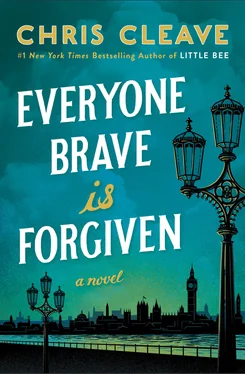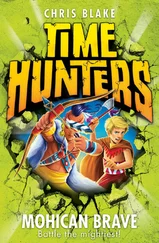The thing was that Hawley Street was there but the school was gone. She walked up and down the length of the street, twice, calmly but briskly, pulling Zachary by the wrist and looking for the school. Because of course the phenomenon would have a simple explanation: perhaps that someone unfamiliar with the area had taken the building and put it back in slightly the wrong place. She started laughing because it was silly that one couldn’t find something so big and stolidly Victorian as Hawley Street School. All she could find was an enormous pile of red bricks, dotted with decorative London yellows. What a ridiculous place to leave bricks. And this was when her stomach fell and she understood that the problem was a perceptual one: that her concussion was worse than she had supposed, that she was hallucinating. It was frightening but at least it all made sense now: Zachary turned white, Tom fast asleep, the school absent without leave. How funny the mind could be. She sat in the thick white dust and laughed.
Afterward they told her it was normal, with shock. Someone came and took Zachary away from her. They had to prise her fingers off his wrist. And then for hours all she could think was what a waste it was: a new carton of chalk had been delivered that morning and now it must be ruined, all twenty sticks of it. She explained to a nurse that they would simply have to make do, and write on the blackboard with the stubs of old chalk.
They took her to a rest center and wrapped her tight in blankets. They told her that it helped to be swaddled like a baby. Days passed, which she experienced as the daylight flickering on and off. As if there were a bad connection. They told her that no bodies had been recovered from inside the school, only fragments. The only body was Tom’s, recovered from the street, and they unwrapped her from the blankets long enough for her to be taken to identify him.
The morgue was an improvised facility, in a church hall. Someone had marked Tom’s forehead with an X, in red grease pencil. It meant that there was an internal injury. They told her Tom had been killed by the pressure wave of a bomb, which was why there wasn’t a mark on his body except for that X. Mary hardly heard them. It was evident to her that the bomb had done nothing to him — that the cause of death must somehow be connected to that terrible letter on his forehead: the unknown in all algebras, the singularity.
She explained this to the woman who was seeing to her in between signing for the deliveries of the remains that were still arriving at the morgue, in sixteen-inch rectangular cardboard containers requisitioned from a grocer, as and when the heavy rescue men brought them out.
Her mother flashed on and off. She told Mary that the heavy-rescue crews had dug into the rubble for four days and nights, bringing out what remains they could, and then they had put lime down.
People asked questions of her. Mary answered that she was quite all right, thank you. No, she did not need more tea. Yes, she was able to supply a list of the pupils and parents who had been present at the nativity play. No, she and Tom had not been engaged; she had been waiting for the poor man to pluck up courage. No, she did not think that if God had seen fit to spare only one child then it was a pity it had to be the picaninny. No, she did not think that the darkies had the devil’s own luck. No, she imagined that the poor child had run out into the air raid simply because he was unusually resistant to sitting where he was told. Well, and if they must put it like that, then yes, she was rather fond of the nigger.
There were no further questions after that, and Mary did not have the heart to trouble people with her own. Goodness knew, everyone at the rest center was exhausted. Everyone had anguish of their own by now — what was every bomb that fell, if not endings under unbelievable compression? Grief was contagious, and Mary would no more speak of her own than she would cough, in a crowded train carriage, without putting her hand to her mouth.
And so she sat and watched the walls, in the grubby rest center with its bulletin board still announcing church business and cake raffles. She read the small advertisements for odd-jobsmen and cat breeders.
She reminded herself to thank Tom, the next time she saw him, for going out into the raid after Zachary. A moment later she understood that this would not be possible, but the understanding did not prevent her from writing it down on a scrap of paper and tucking it into her sleeve: Remember to thank Tom . He had left the shelter to go into the thick of a bombing raid. That he was dead and that she must thank him the next time she saw him: for weeks it was possible to believe both these things at once.
Quite early on, even before the days slowed their flickering and began to come and go with their usual shopkeeper’s frequency, Mary decided that she would never speak of how she felt. One could only trudge away from the place to which one had hurried with such joy at the start. One could only begin again, a year older, and resolve to carry oneself in such a way that the pressure wave of the tragedy was contained within one’s own body, and could not spread one inch further.
ON CHRISTMAS DAY THE regiment hosted the companies of all the convoy escort ships tucked into Grand Harbour. In sunshine, more than a thousand officers and men assembled in the courtyard of Fort St. Elmo for a service of nine lessons and carols and a tot of Nelson’s blood, supplied by the visiting Navy. Five hundred years of tradition having established the order of service, the rum was administered before the singing.
Though the enemy’s blockade was biting and supplies on the island were scarce, Alistair supposed the War Office had established a vast cache of polishes. Two thousand black boots glowed as if with an inner light. Twelve trumpets, eight trombones, four tubas and a euphonium blazed like the armor of Achilles. It was the genius of motivated men that even when rendered impotent by conditions of total encirclement, they could make themselves preternaturally shiny. As the last chorus of “O Come, All Ye Faithful” reached its triumph, Alistair was nearly blinded.
After the service he sent the men of his battery for a second trip to the rum urn, with instructions to make only a mild nuisance of themselves. He went up to his little cell high in the walls of the fort. When his subaltern, Briggs, dropped by with an airmail fresh from the airfield, Alistair could have kissed the envelope. Warm from the Navy’s liquor he really did feel a glow of goodwill toward all men, even those of the enemy persuasion. It was big of the Italian aviators to let a mail plane through the blockade on Christmas Day. One hoped that one’s own side was reciprocating, in some other theater where Britain was in the ascendant. One struggled to think where that might be — but at Christmas one could think of sleigh bells instead.
The aerogramme bore Tom’s parents’ address in the “Sender” box. Alistair tore it open. How perfect that Tom’s reply should reach him on Christmas Day. Assuming of course that Tom was writing to forgive him for the awkwardness at the Lyceum, then how apt.
The letter was from Tom’s father. The handwriting was almost like Tom’s, but slightly slumped. He was sorry to have to let Alistair know that Tom had been killed, on the nineteenth of December, in an air raid. Since Tom had thought of him as a brother, Alistair was to think of the Shaws as family and to write if there was ever anything they could do.
Alistair put down the letter and stood at the arrow loop window. He watched the forenoon glittering over the sea. In the distant haze he could just make out the flashing signal mirrors of the Italian blockade ships. If one forgot for a moment that the messages wished one evil, they were beautiful.
Читать дальше












